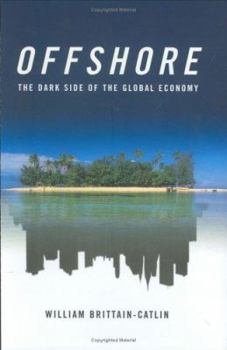Offshore: The Dark Side of the Global Economy
Select Format
Select Condition 
Book Overview
An unknown realm to many investors, offshore finance allows giant corporations--such as Wal-Mart, British Petroleum, and Citigroup--to legally keep huge profits out of sight of regulators and the... This description may be from another edition of this product.
Format:Hardcover
Language:English
ISBN:0374256985
ISBN13:9780374256982
Release Date:July 2005
Publisher:Farrar Straus Giroux
Length:272 Pages
Weight:1.15 lbs.
Dimensions:1.0" x 6.3" x 9.4"
Customer Reviews
5 ratings
Prescient
Published by Thriftbooks.com User , 15 years ago
Published in 2005, William Brittain-Catlin nevertheless had the foresight to challenge the received wisdom of his day: 'In both the neoliberal and reformist positions there is a strong element of naive idealism: in the former that a world of unrestrained economic liberalism would not bring about such catastrophe that the state would need to step in and sort out the mess'. Although we are indeed living in such a time, this is still an excellent analysis of how we got to where we are, mixing case studies, history and philosophy in a highly intelligent way
WOW
Published by Thriftbooks.com User , 16 years ago
My criteria for a book is simple. I want an interesting subject, I want good writing, and I dont want any wacko-eruptions where the author forgets to take his meds and strange things spill out. That said, this book is a pretty good primer about how major corporations avoid paying taxes while getting the full benefits and protection of the American government. I mean, if the current warlord of Lower Slobovia confiscates EXXON's oil wells there, will the Cayman Marines invade Lower Slobovia to get the oil back? Not likely. American Marines will. Marines paid for by middle-class taxpayers like you. The rich dont pay taxes, either; nor do they join the Marines. They go to Washington and make laws that enrich themselves and the multinational corporations who pay no taxes. Excellent book on the subject!
A flawed gem
Published by Thriftbooks.com User , 19 years ago
Offshore is a solid attempt to explain the fact that modern capitalism has become dependant upon the offshore, largely unregulated, international financial system. The cost of making tax-rate shopping a profit center in a corporation's strategic plan when revenues land back 'onshore' is paid by all of us. Essentially multi-nationals are competing to see who can pay the least tax. In the end, this behavior is to an economy what eating your seed corn is to farming. Brittain-Catlin is sounding an alarm hoping public policy makers and the public will heed. The author's prose is sometimes purple and his discursions into tangental topics is somewhat distracting, but on the whole, the book is worth reading for the very approachable manner in which it explains the history of offshore banking and how it ties into subjects such as BCCI, terrorism finance, drug money laundering, the 'private' bail out of the hedge fund LTCM, the capital flight that hammered Indonesia and other developing nations, and the collapse or corruption of companies such as Eron, Tyco, and Global Crossing. After reading this book, the business news achormen chattering about the 'mood' of international capital will begin to make some sense to you.
An important glimpse in to the world of Money and Power
Published by Thriftbooks.com User , 19 years ago
"Offshore" is a compelling and disturbing glimpse into the dark underworld of global money and power. It is extremely well-researched and comprehensive, covering international dirty-dealing and capital from Enron to Parmalat to LTCM. Very illustrative and thought-provoking. A first-rate primer on International Capital and also a great read. Pay special attention to the segments on "the secret realm," where capital is free of all national identity and boundaries. In addition the writing is very fluid, clever and witty. An important book.
A Primer on Offshore Banking
Published by Thriftbooks.com User , 19 years ago
This is kind of two books in one. On the one hand there is an explanation of how corporations basically avoid taxes by setting up perfectly legal tax shelters around the world. The second part of the book is rather philosophical in tone, emphasizing the point of view that somehow these corporations shouldn't be doing this. Way back when the Beatles were popular, I remember being surprised when I heard that they were really employees of a corporation set up offshore somewhere. The taxes in England at the time were something like 90%. Hey, it made good sense. As I grew older I learned more about taxes, usually by having to pay them. But I also learned that there are limits to taxes at which it is more beneficial to find a way to not pay them than it is to make more money. Of course you want to stay on the legal side of the boundry, because jail is not a good thing -- ask Martha Stewart. Of course if she had done her stock trading with an account in Vanuatu or some place like that she almost certainly wouldn't have done jail time. This book talks about what companies do to reduce their tax burden. And it's a pretty good primer on how to do it. His philosophical point of view is another matter. He seems to feel that there is something basically imporal about this. Be assured though, that the politicians and the tax authorities know all about this. Knowing that this will happen, they simply raise taxes a few percent.






